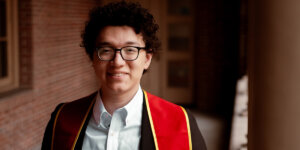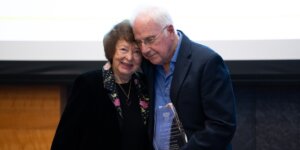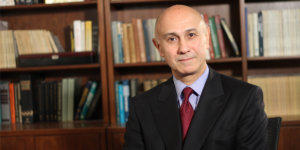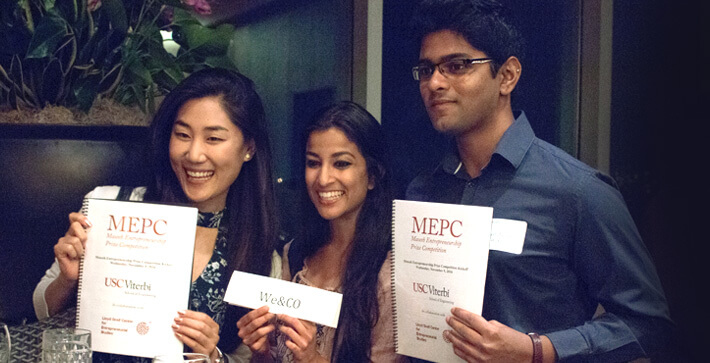
Aspiring entrepreneurs at the MEPC kickoff. (Photo/Valentina Suarez)
When patients don’t take their prescribed medication, they risk becoming sicker or even dying.
Unfortunately, studies show for every 100 prescriptions, less than one-third are taken as directed. There are many reasons for this: patients forget to take their pills, stop taking them before they complete the cycle, or never pick them up to begin with.
USC Viterbi biomedical engineering student, Dina Levashova, and her four colleagues at fledgling startup, Pichi, believe they have come up with an effective, fun way to encourage people to take their medicine. They hope to create a free mobile app that displays a virtual sick pet on a digital device. As patients take medicine, their pet grows healthier; if they don’t, the pet becomes sicker.
To validate their concept and understand customer needs, Levashova and her team have joined the Maseeh Entrepreneurship Prize Competition, or MEPC. Over the next six months, Pichi and 16 other USC Viterbi student-led teams will attend workshops about customer discovery, intellectual property, learn about business models and sharpen their entrepreneurial skills.
“We think we have a great idea, and this is a great learning opportunity, especially for students like us who don’t know where to begin,” Levashova said.
On Wednesday, Nov. 9, MEPC held its official kickoff where the aspiring entrepreneurs met for the first time with team mentors, who over the next half year will help them translate their ideas into viable companies.
A record 60 teams applied for 17 slots. Several USC Viterbi faculty members are participating, including electrical engineering Professor Mahta Moghaddam; Yong Chen, associate professor of industrial and systems engineering, Young Cho, research assistant professor of computer science, and Michael Zyda, director of the USC GamePipe Laboratory.
“We had a huge number of applications,” said Peter Beerel, MEPC program director and a USC Viterbi associate professor. “MEPC has generated a lot of interest.”
Among the teams, one wants to create a wearable chest monitor that would continuously check heart and respiratory rates to prevent Sudden Unexpected Death in Epileptic Patients, or SUDEP. If the monitor detects any abnormalities, an alarm would be triggered. Another burgeoning firm, Stellar VR, hopes to build a global virtual reality platform that enables participants to represent their true selves and have shared experiences.
A currently unnamed team hopes to commercialize newly developed multi-material 3-D printing technology that is fast, inexpensive and high quality.
MEPC, founded in 2010 with a $1 million endowment from entrepreneur Fariborz Maseeh, has become one of the university’s premier business model competitions for USC Viterbi and other students, faculty and other would-be business builders.
At stake is over $100,000 in prize money and legal services.
Greg Autry, a USC Marshall School of Business assistant professor of clinical entrepreneurship and MEPC education coordinator, said the skills MEPC participants acquire matter as much as the awards.
“The business experience of engineering students varies, but in general they can use a lot of help in creating a profitable business model out of great engineering ideas,” he said. “Sadly, the business record is littered with great technical ideas that were not back by viable business models.”
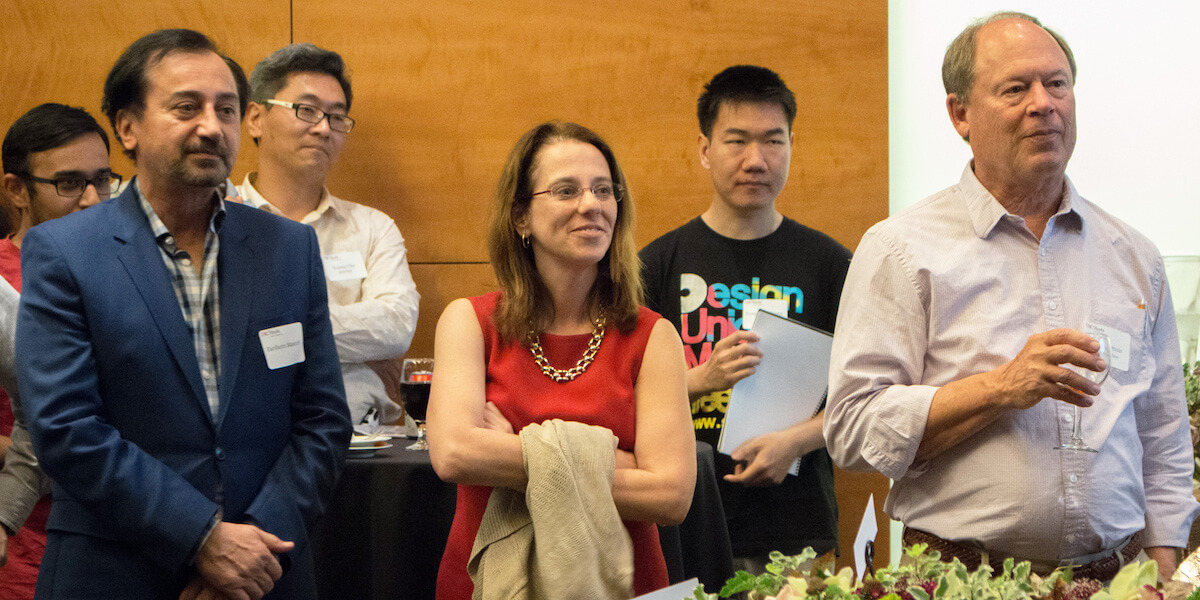
MEPC namesake Fariborz Maseeh (in Blue) and Vice Dean of Technology, Innovation and Entrepreneurship Andrea Belz (Photo/Valentina Suarez)
MEPC has spawned several promising companies.
NoseKnows, late year’s winner of $50,000 in cash and $20,000 in legal services, makes an app to make it easier to recover runaway dogs and other pets. The 2015 champ, BIRS, leverages proprietary eye-tracking software for a quick and objective concussion assessment. The 2014 victor, ComfortCorrect, makes affordable braces that incorporate programmable memory wire technology.
Second Spectrum, the 2013 champion, analyzes Big Data for insights into sport performance, such as what constitutes good defense and offense in basketball. The firm counts the Los Angeles Clippers and Boston Celtics among its many NBA clients.
“MEPC is a flagship competition in programs linking engineers with the marketplace, including the Min Family Engineering Social Entrepreneurship Challenge, HTE@USC and the NSF-sponsored I-Corps Node,” said Andrea Belz, director of the NSF-funded Innovation Node – Los Angeles and entrepreneur in residence at USC Viterbi. “This broad portfolio of programs has grown tremendously as USC Viterbi has become a leader among universities that accelerate engineering with impact.”
For the third consecutive year, each team will receive $2,500 from the National Science Foundation to canvass potential customers around the country to learn their problems and how they might address them. The NSF dispensed the money to USC through an I-Corps site award.
Seven or eight MEPC semi-finalists will be selected in the spring. Four winners, including the grand-prize-winning team, will be announced in April.
“It’s going to be a great competition,” Beerel said.
Published on November 14th, 2016
Last updated on May 14th, 2025




